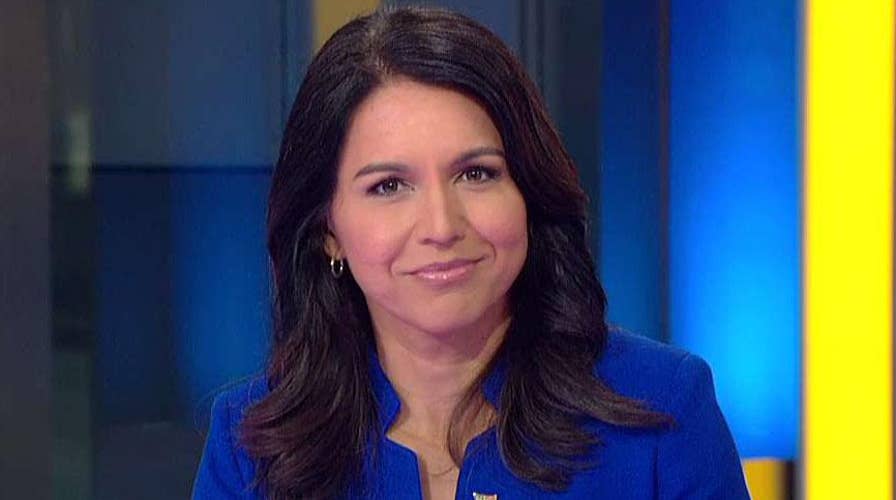Rep. Tulsi Gabbard on calls for impeachment, US response to Saudi oil attacks, new DNC debate rules
Democratic presidential candidate Tulsi Gabbard joins Brian Kilmeade on 'Fox & Friends.'
She made a big deal about threatening to boycott Tuesday’s Democratic presidential debate, but in the end Rep. Tulsi Gabbard of Hawaii decided to not skip out on the nationally televised primetime showdown.
“I will be attending the debate,” the White House hopeful tweeted Monday morning.
On Thursday, the anything-but-predictable congresswoman and Iraq War veteran accused the Democratic National Committee and the media of “rigging” the primary battle against many of the lower tier candidates and political outsiders running for the nomination.
GABBARD THREATENS TO SKIP DEBATE TO PROTEST DNC RULES
“I am seriously considering boycotting October 15 debate to bring attention to DNC/corporate media’s effort to rig 2020 primary,” she tweeted at the time.
And in an accompanying video, Gabbard pointed what she called “arbitrary” and non-transparent requirements to qualify for the debates and she argued Democratic Party leaders “are trying to hijack the entire election process.”
“In order to bring attention to this serious threat to our democracy, and ensure your voice is heard, I am giving serious consideration to boycotting the next debate on October 15th,” she added.
Gabbard said on Thursday that she would decide in the coming days whether she would skip the debate.
There’s been a chorus of criticism for months by many of the lower tier candidates over the debate thresholds, which have prevented many in the record-setting field of White House hopefuls – which topped out at roughly 25 contenders this summer – from making the debate stage.
Gabbard – who for months has been quite vocal in her criticism of the DNC and their criteria -- qualified for the first two rounds of debates, held in late June and late July. But she failed to make the cut for last month’s third round showdown.
BULLOCK: NOMINATION 'WON'T BE DECIDED BY DEBATES'
Gabbard qualified for Tuesday’s debate, which will be held in Westerville, Ohio. Twelve of the remaining 18 Democratic presidential candidates made the cut.
The DNC has been raising the thresholds to qualify for the ensuing rounds of debates. To make the stage for the November debate, candidates have toreach 165,000 campaign contributions from unique donors and hit at least 3 percent in four polls approved by the DNC. Only eight candidates – to date – have qualified, and Gabbard is not one of them.
Pushing back against the criticism, DNC Chair Tom Perez told Fox News last month that the process has been “eminently fair” and added “we’re going “to continue to be transparent.”
The winnowing of the field by the DNC has been criticized by many people in the first four states that traditionally vote primary and caucus presidential nominating calendar. Activists argue that the job of narrowing the field belongs to the voters in the early states rather than with national party leaders.
Gabbard emphasized that “the DNC and corporate media are rigging the election…against the American people in the early voting states of Iowa, New Hampshire, South Carolina, and Nevada.”
She told reporters during a stop Thursday in New Hampshire – which holds the first primary in the White House race – that voices of frustration from early state voters drove her to make her announcement.
Gabbard said she was trying to figure out “how best I can draw attention to the serious threat to our democracy, and make sure that the voices of voters that I’ve heard from across the early states – especially – are heard.”













































